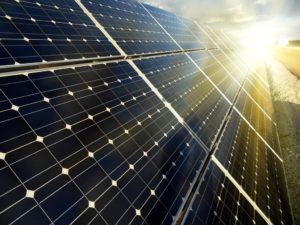
UDP Renewables (Kyiv) plans by the end of 2019 jointly with Spain’s Acciona Energia Global to build two solar power plants in Odesa region with a capacity of almost 44 MW.
According to a report of UDP Renewables on its Facebook page, the total investment in the projects reached EUR 30.6 million. Construction works will start this week.
New solar power plants Hudzovka-Solar (Izmail) and Artsyz-Solar (the area of Pavlivka rural council) will have the peak capacity of 26 MW and 17.7 MW and the projected capacity of 19.8 MW and 13.5 MW respectively.
As reported, UDP Renewables is part of the UFuture Investment Group with its head office in Brussels, which was established in the fall of 2017 and brought together business projects of Vasyl Khmelnytsky.
In June 2018, UDP Renewables announced an agreement with Acciona Energia Global on a joint project to expand the Dymerka solar power plant to 57.6 MW by introducing its second, third and fourth phases. The first phase of the station with a capacity of 6 MW was launched by UDP Renewables in September 2017. Currently, Acciona is the only participant in this project through Dymerka Solar Poland.
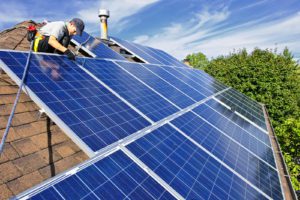
In January-March 2019, 1,393 Ukrainian households installed PV modules with a total capacity of 33 MW, Director of the renewable energy department of the State Agency for Energy Efficiency and Energy Saving of Ukraine Yuriy Shafarenko has written on his Facebook page.
According to him, thus, by the beginning of April their total number reached 8,850 families, and the total installed capacity was 190 MW, which is about 20% more than it was at the beginning of the year.
The capacity of home solar power plants is an average of 21.5 kW per family.
The largest number of plants was installed in Dnipropetrovsk (1,072 families, 25 MW), Kyiv (904, 25 MW), Ternopil (808, 21 MW), Ivano-Frankivsk (50, 13 MW) and Kirovohrad regions (562, 15 MW). Shafarenko said that the greatest activity is observed in those regions where local support programs are in effect, providing for compensation of a part of the cost of equipment (from 10% to 30%).
As reported, the number of Ukrainian households that installed PV panels in 2018 more than doubled (by 4,500) and reached 7,500; the total capacity of the equipment installed by them reached 157 MW by the end of 2018.
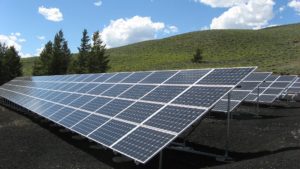
Norway’s Scatec Solar in 2018 established and acquired around a dozen of companies in Ukraine to implement its projects to build solar power plants. According to a report of Scatec Solar for 2018, the company entered into agreements with Rengy Development and obtained 51% in Rengy Bioenergy. At the end of 2018, the companies started building a solar power plant in Mykolaiv region with a capacity 47 MW for EUR 52 million. The European Bank for Reconstruction and Development (EBRD) and the Black Sea Trade and Development Bank (BSTDB) signed credit agreements of 50% each of the non-recourse debt financing of the project. The credit facilities amount to EUR 36 million and covers 70% of the total project costs. Commercial operation is expected during 2019.
In 2018, Scatec Solar signed agreements securing the 30 MW Kamianka project in Cherkasy region with a total investment of EUR 35 million. EBRD and FMO, the Dutch development bank, signed credit agreements for the non-recourse debt financing of the project. The credit facilities amount to EUR 24.5 million and covers 70% of the total project costs. Construction started early 2019 with commercial operation expected in fourth quarter 2019.
During 2018, Scatec Solar signed agreements securing projects with total capacity of 251 MW in Ukraine. Two of these projects secured financing in 2018 and moved into construction with 174 MW in project backlog. Total capex for the projects is estimated to EUR 193 million. In Ukraine, Scatec Solar is developing projects totalling 163 MW in addition to the 251 MW in project backlog and under construction.
For the implementation of the projects the company also established Scatec Solar Ukraine Opr Comp (EPC) in 2018. The Norwegian company in 2018 via its Dutch subsidiary Scatec Solar Ukraine B.V. became owners of 100% of Atlas Capital Energy, Greenteco SES, Progressovka and Boguslav Energy.
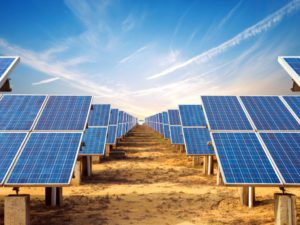
TIU Canada plans to complete construction of two solar power plants with a total capacity of some 31 MW in Lymansky district of Odesa region this summer, TIU Canada in Ukraine Manager Valentyna Beliakova has said in an interview with Reform.Energy portal.
Commenting on plans to expand the solar power plants portfolio to 100 MW, she said that the company will return to them after the adoption of the law on green auctions.
According to the forecast of Beliakova, the market for the construction of solar power plants in 2020 after the introduction of auctions will definitely begin to fall. “Until the auction system will be adjusted, until investors will understand how to work on it, and until they will allocate quotas… the volume that is planned to be provided to all renewable energy facilities now – and the numbers of 500-700 MW per year are voiced – is small,” she said.
Commenting on the fact of the high tariff for the purchase of electricity from the solar power plants in Ukraine, Beliakova said that in Germany, one of the first to introduce this mechanism of support for renewable energy, the tariff was valid for 10-15 years at a fairly high level. In Ukraine, less time has passed since the establishment of the feed-in tariff, moreover, in 2015-2016, it was reduced.
“In addition, how are auctions held in Germany? The winner is provided with land parcels, technical conditions for connection. This significantly reduces the cost of the project. The investor can only install equipment. They have clearly defined territories, free capacity and connection conditions,” the head of TIU Canada in Ukraine said, noting that in view of this it is incorrect to compare the tariff of 15 eurocents per kWh in Ukraine with the tariff of 4-6 eurocents in Germany.
According to Beliakova, the stimulation of green energy, of course, should be only until its share reaches a certain level. “However, Ukraine does not yet follow the schedule for renewable energy facilities outlined in the Energy Strategy,” the head of TIU Canada in Ukraine said, recalling that the share of alternative sources of Ukraine’s overall generation remains low – less than 2%.
As reported, TIU Canada began its activity in Ukraine in June 2017. Its owner is the investment company Refraction Asset Management (Calgary, Canada). The company has already built a solar power plant with a capacity of 10.5 MW in Nikopol and is building another one in Mykolaiv region with a capacity of 13.5 MW.
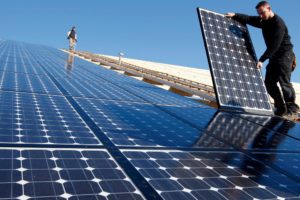
Kness Group, a large EPC (engineering, procurement and construction) contractor in Ukraine, has launched first own solar power plants with a total power capacity of 33 MW, Director General of the group Serhiy Shakalov has said in an interview with the Energy Reform website.
The total investment in construction of the plants was EUR 30 million, including EUR 4.5 million of own funds of the group, and the rest is borrowed funds from Danish IFU and the European Bank for Reconstruction and Development (EBRD).
The major EPC contractor includes the engineering company Podilsky Energy Consulting. The company sells inverter equipment, power collection cabinets, generation monitoring systems and supporting structures for Ukrainian-made solar cell arrays. In February 2019, the group launched a first large solar cell arrays plant in Ukraine.
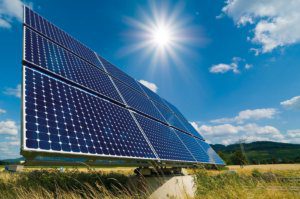
The Kness Group, a large Engineering, Procurement, Construction (EPC) contractor on the Ukrainian alternative energy market, this year started building own solar power plants and soon intends to launch the capacity of 33 MW, Kness Director General Serhiy Shakalov has said. “To a large extent, we started building our own capacities only this year. Now we are commissioning 33 MW. These are our capacities,” he told Interfax-Ukraine. Shakalov said that the group mainly acts as an EPC contractor in projects, building solar power plants for clients according to different financial models.
He said that Kness has already implemented projects with a total capacity of more than 200 MW. “And now about 200 MW are being built, and the plans are great,” the general director said.
Speaking at the Ukrainian Financial Forum organized by the ICU investment group recently, he pointed out the high interest of investors in solar power plants for the period before the introduction of auctions.
“Why interest? Because the business is clear, simple and fairly well insured: almost a state guarantee in the form of state purchases of electricity. Plus a very low OPEX,” Shakalov said.
According to him, Kness (at that time, Podilsky Energoconsulting) first started building alternative energy facilities, and at the beginning of 2016 it almost completely focused on solar energy and “did not miscalculate.”
Shakalov said that even with the introduction of auctions expected after 2020, the construction of a solar power plant still remains interesting, since there is more money, technology and construction companies on the market than it was before. Among the problems he highlighted a lack of quality facilities and qualified personnel, which does not allow scaling projects.
“We are not afraid of the auction system. We are actively preparing for them (auctions). We are looking positively in 2020,” the general director of Kness said. In his opinion, the introduction of the auction system will create another competitive field in which other financial models will compete, although there is no clear understanding yet. Shakalov also said that it will have to compete more with large international companies, and also more actively develop new regions, since the density of implemented projects in Kherson and Odesa regions is already high.